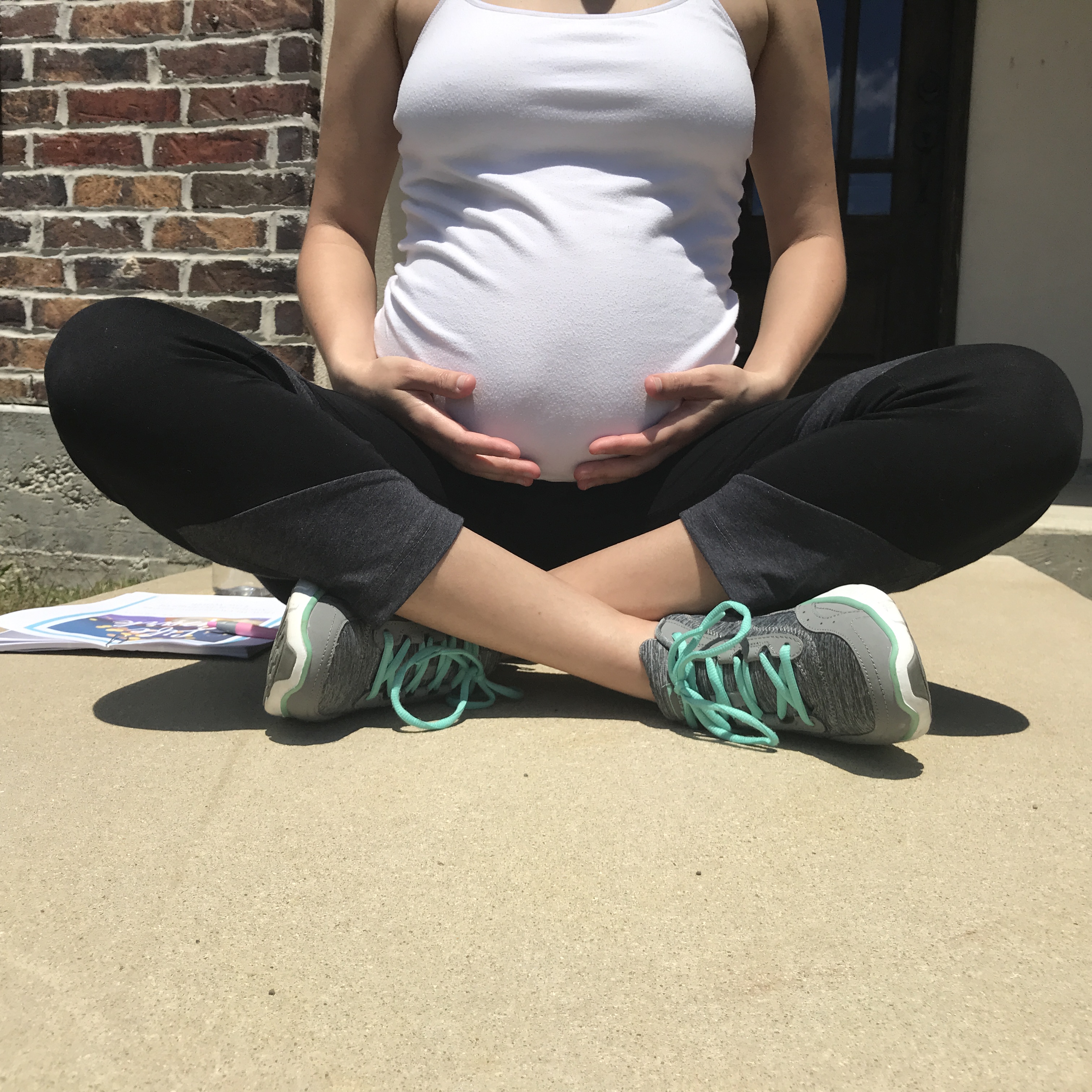Anxiety has never been a big thing for me. There have really only been two stages in my life where I found myself regularly feeling tightness in my chest: the first was when I had endured so much stress that I literally burned myself out and the second was when I reached the third trimester of my fourth pregnancy.
Because I had been on a healing journey to recover from my extremely stressful life stage, I knew that the anxiety symptoms during pregnancy needed to be quickly addressed. Although my midwife prescribed an Rx for it “just in case,” I knew that I didn’t want to fill the script unless I absolutely tried everything else first.
Here is a list of some of the ways I coped with my anxiety during pregnancy:
1. Meditation (as needed)
Knowing that meditation helped to control my anxious mind before, I knew that meditation could also benefit me during pregnancy.
The only difference was that I didn’t really feel like my mind was an issue during pregnancy like it was before.
Before, I struggled with low-self esteem and was trying to figure out my place in this world, where I belonged, what I could offer. I was depressed and felt deflated.
But during pregnancy, I didn’t feel those same emotions. I just experienced anxiety in my body through chest pain and contractions.
I had learned from an episode of Evidence Based Birth Podcast that there is a direct correlation between how stressed a person is and how much pain they perceive.
Because of that information, I knew that my body was just responding to my life stress. I knew that meditation would help me with stress by:
- Training me to breathe deep, not shallow. Often times when we are stressed, our breathing changes. The change in breathing alone can cause chest pain.
- Forcing me to become more present in the moment so that I don’t live in my head in the past or future, greatly reducing anxiety.
- Keep my blood pressure low and allow me to react less jarred when faced with stress.
2. Remove self-imposed obligations
As a blogger who is building a brand and trying to grow a following, I put self-imposed obligations on myself that under normal circumstances are fine, but once my body started reacting negatively to those obligations, I knew I had to remove them.
Why remove versus reduce?
Your situation may vary, but I made the decision to completely remove it based on a few factors:
- Summer vacation for my school aged kids was about to start and that was going to make my blogging obligations more difficult to accomplish. I knew I would stress out more over not meeting my self-imposed rules for how often to post.
- Preterm labor symptoms started when I was just 24 weeks. I knew I had many, many more weeks to go before baby girl would be fully ready for her debut and removing obligations felt like it would eliminate the most amount of stress possible, increasing her chances to cook as long as possible.
- I already intended on going on a virtual maternity leave where I would completely step away, except I had hoped that I would have written posts to be published on a schedule so that it didn’t look like I’d gone anywhere. Deciding to completely remove my blogging obligation also meant forgiving myself for not having things together as originally planned.
3. Protect your energy
While pregnant, I had to pay attention to what activities I did and how they made me feel not just during, but afterward.
For me, this meant giving up control and letting a service grocery shop for me. It eliminated the stress of reading off a shopping list while walking down the isles of the store, often with all my kids in tow. It truly was a lifesaver and saved me from the physical and mental exhaustion that usually followed a trip.
Another way I had to protect my energy was by only allowing myself to participate in activities that I genuinely wanted to participate in. It meant that I didn’t sign my kids up for any organized summer activities because my pregnancy anxiety just couldn’t handle all that it would envolve. By not having a schedule to follow, it made the summer easier for me by giving myself permission to only do activities when I had the mental and physical energy for them.
4. Prenatal massage therapy
This last pregnancy was the first pregnancy that I fully understood the benefits of participating in regular prenatal massage therapy. I went approximately once per month and even closer together in the final weeks.
I knew that it would help with anxiety because it would obviously force me to take a break from being a mom for a few hours while I drove to and from my appointment in …. ready for it? … silence! That by itself was worth the babysitting fee!
Of course, the massages themselves helped to keep my body from literally falling apart. I’m no spring chicken and being pregnant in my 30s made me hyper-aware of all the aches and pains that weren’t there in prior pregnancies. (How do women do this in their 40s?)
If anything, the massages helped me not feel so old.
You can educate yourself on the benefits of prenatal massage through this article from Massage Magazine or this one from the American Pregnancy Association.
5. Prenatal chiropractic care
I introduced prenatal chiropractic care late in my pregnancy when I was 36 weeks. I wish I would have started sooner.
The main reason I decided to suck up the cost and go was that I started to feel way more round ligament pain and hip pain than in other pregnancies. Plus, I was started to get anxious about post-birth hip pain and dealing with the discomfort of a rotated pelvis.
At my first visit, I was told that my SI joint was locked up on the right side, causing my pelvis to be slightly rotated, which was the cause of the right hip pain and sciatica down my right leg. It was also the reason why I started walking with a limp, which I feared would turn into an exaggerated limp post-delivery like during my third pregnancy.
My prenatal chiropractor specializes in helping pregnant women get the care they need and is certified in the Webster technique, which is a safe way for pregnant woman to get adjustments to their pelvis.
After just a few visits, my waking improved and the added physical therapy she incorporated into my appointments were a big help when I went into labor at 39 weeks. I attribute those exercises to the reason my thighs weren’t sore afterwards.
On a side note, if you’ve ever been pregnant and think you might have an issue with your pelvis as a result of past pregnancies, you could benefit from seeing a prenatal chiropractor for an adjustment. I’ve heard that some women get their SI joint locked up during pregnancy or delivery and it stays locked for years and causes pain and issues in other areas as a result. I believe my joint has been locked since at least my 3rd pregnancy (over 4 years) and even though I saw a chiropractor in the past, he wasn’t trained in Webster techniques to help unlock the joint.)
6. Doula care
Around 30 weeks, I started freaking out about my ability to have another natural birth. More specifically, I worried that my husband wasn’t going to provide enough labor support.
I love him to death but he isn’t exactly the best caregiver.
And that’s not his fault. Not everyone has that natural ability.
He’s more of a take action kind of guy. He’s great at following direction, but when I’m in labor, and I need someone standing nearby to remind me to breathe or to monitor my contractions and demeanor, he isn’t the one for the job.
And he knows it.
When I found out I was pregnant, I did an initial search for a doula in my area and didn’t find one. At that point, I accepted the idea that I would have to just go at this alone.
But anxiety started to build as I got closer and closer to my due date. I knew that hiring a doula would greatly ease my anxiety. So I set out to find one.
And it didn’t take long.
Doula’s do more than just assist with labor when the big day arrives. They offer limited support during your pregnancy and are a great resource to turn to with questions about anything related to labor, delivery, breastfeeding, and postpartum care.
If anything, it at least helps to have someone to talk to about how you are feeling if you cannot get the support you are looking for from your husband or partner.
When the big day arrived, I was very grateful that my doula was present to assist with what was a much tougher transition than my previous delivery. My anxiety in the labor room was definitely less with her around.
What are some ways that you have coped with anxiety during pregnancy?
Originally published at lifesparkwithlauren.com


